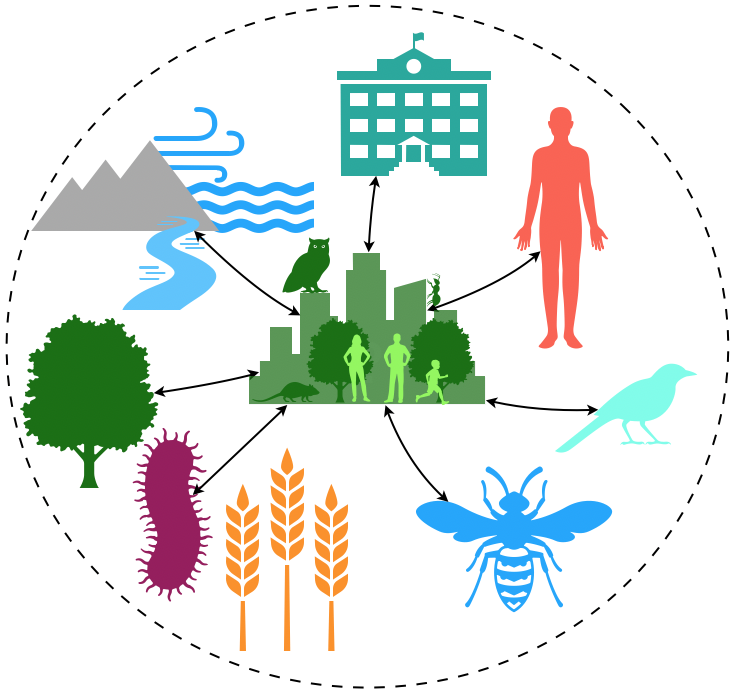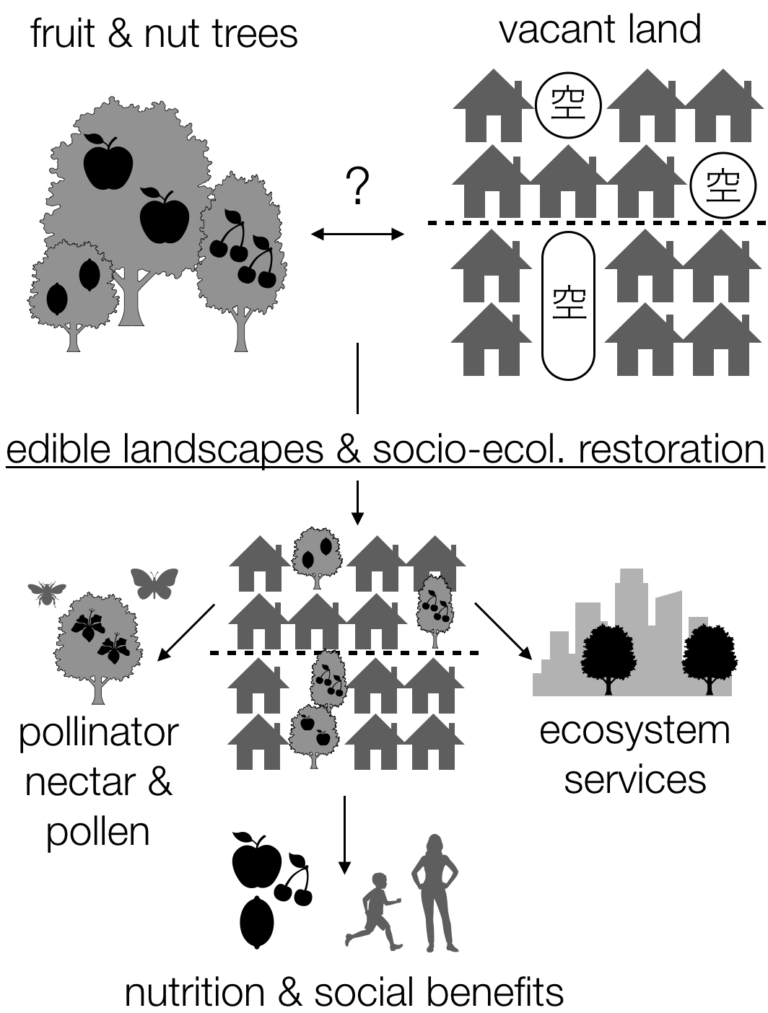Multispecies urban futures: degrowth, commons, and landscape stewardship approaches to sustainability
多種が共生できる都市:脱成長、コモンズ、ランドスケープの管理から持続可能性を考える
Why multispecies cities?
なぜ多種が共生できる都市?

How cities develop in the 21st century will shape human-nature relationships. This research theme explores more-than-human urban futures through degrowth, commons, and landscape stewardship-inspired approaches to urban sustainability. A more-than-human / multispecies approach to cities can provide new insights because it takes into account other-than-human agency: people are not the only ones shaping cities and their landscapes (the 2020 coronavirus pandemic is a dramatic example). Acknowledging this opens up new worlds of possibilities for rethinking cities in more sustainable ways. This theme thus covers several concurrent projects, all centering around the question: how can we (re-)make cities to be sustainable and provide more-than-human wellbeing?
Edible landscapes as multispecies commons
マルチスピーシーズ・コモンズとしてのエディブル・ランドスケープ

Starting from 2020, one project will look into the potential of edible landscapes as multispecies commons for socio-ecological restoration of vacant land in shrinking Japanese cities. Over 90% of Japanese cities larger than 100,000 inhabitants will shrink until 2045, leading to “spongification” and increased vacant land. Recent research on depopulation proposes that landscape and urban planning can use shrinking processes to provide social and ecological benefits. In particular, edible landscapes can benefit people and nature through providing spaces for multispecies conviviality. Together with research assistant Lihua Cui (Kyoto University), we look at Sapporo and Kyoto as case studies to assess what trees and bushes are best suited for different types of vacant land. Based on this analysis, we aim to create a toolkit to implement edible landscapes as multispecies commons to achieve a positive urban degrowth in shrinking Japanese cities. This research is funded by the Japan Society for the Promotion of Science with a three-year Grant-in-Aid for Young Scientists (2020-2022). Early results include our paper on edible urban commons for resilient neighbourhoods in light of the pandemic.
Post-growth landscape theory?
ポスト成長のランドスケープ理論?
The work above builds on a past research around landscape stewardship, cities, degrowth and more-than-human geography. Specifically, I have worked to develop a landscape stewardship model for biocultural cityscapes (satomachi, 里町), drawing on the traditional Japanese concepts of satoyama and satomachi as well as the biocultural diversity theory. One major output of this research was recently published in the form of a special issue I co-edited on landscape and degrowth in post-growth societies with a focus on Japan, including my conceptual paper (in Japanese) on degrowth and landscape. Another preprint examines how we might decolonize our imaginaries from capitalism, and who might help us to do so.
Human-nature relationships: Japanese honey bees
人と自然の関係:ニホンミツバチから考える

Another project is examining human-nature relationships with Japanese bees (Apis cerana) and its associated social practices. Japanese bees are interesting, as they are neither domesticated nor completely ‘wild’. Provide shelter, and they may come, or not — or they stay, or leave! In particular, the role of hobby beekeepers and other stakeholders, as well as the bee-friendly city as a vision for more livable urban areas have proven a fascinating area of study. Early results bring insights into demographics and motivation of hobby beekeepers, as well as into attitudes of residents towards urban beekeeping. This project is a joint effort lead by Dr. Maximilian Spiegelberg (RIHN) and conducted in collaboration with Rika Shinkai (RIHN) and Dr. Jingchao Gan (Nagoya University), and has won several internal and external grants. It has also led us to become beekeepers!
Multispecies urban futures
多種が共生できる都市の未来

A number of other activities related to multispecies urban futures are ongoing. For example, with colleagues we have in April 2021 released the solarpunk-inspired speculative fiction anthology “Multispecies Cities” published in collaboration with World Weaver Press. Work is underway for a fundamental re-definition of the sustainability concept based around multispecies ideas. With AOI Landscape Design and Lihua Cui, we are exploring what a multispecies community garden design might look like. Some of this research was funded by a Incubation Study grant by the Research Institute for Humanity and Nature (2019-2020). Starting 2020, we will also be collaborating with Dr. Joost Vervoort (Utrecht University) on the ANTICIPLAY project looking at gaming and anticipatory governance.